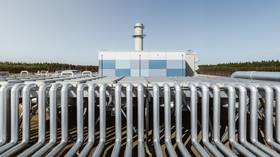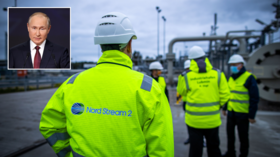America's billion-dollar gas game: Nord Stream 2 threatens US energy exports to Europe. No wonder Washington wanted to block it

The US and Germany came to a historic agreement last week over the controversial Nord Stream 2 gas pipeline, as a compromise between the hawks who have sought to sink the project and those who want to do business with Russia.
However, efforts to draw a line under the debate over the almost-finished energy link have clear-ly not pacified Ukraine’s foreign minister. Dmytro Kuleba was quick to reply to the news on Wednesday, saying in a joint statement with Poland’s foreign minister that the proposals put forward to alleviate the “security deficit” caused by Nord Stream 2 “cannot be considered suffi-cient.”
The pipeline, which stretches through the Baltic Sea and connects the gas fields of Siberia direct-ly to Germany, is already 98% complete, with the final stretches set to be laid in August. Though US President Joe Biden’s White House has sought to portray the new settlement with Berlin as the final word on the matter, some American lawmakers are still pushing to see the US impose sanctions on the Nord Stream 2 project.
US self-interest in European energy
The ‘Joint Statement of the United States and Germany on Support for Ukraine, European Ener-gy Security, and our Climate Goals’ states that “the US and Germany are united in their belief that it is in Ukraine’s and Europe’s interest for gas transit via Ukraine to continue beyond 2024.” Kiev has consistently claimed, despite Russian denials, that Moscow will seek to cut off the sup-plies flowing through the Soviet-built overground gas network once the underwater link is com-plete.
It goes further, saying that “Germany commits to utilize all available leverage to facilitate an ex-tension of up to 10 years to Ukraine’s gas transit agreement with Russia.” This wording amounts to little more than a promise on the part of Germany to try to persuade Russia into continuing to use Ukraine as a gas transit hub and pay for the privilege.
Be that as it may, American and German establishment officials likely envision two primary out-comes from forcing Russia to route its gas supply through Ukraine. For one, Ukraine would con-tinue to benefit from revenues accrued by charging transit fees on the flow of Russian natural gas through its territory. In 2020, Russia’s Gazprom paid $2.11 billion to Naftogaz, Ukraine’s state-owned oil and gas company, for gas transit services. Kiev is eager to maintain this lucrative stream of revenue, and Washington is more than willing to help as it continues to pull the country into its sphere of influence.
Secondly, it would be fair to expect the cost incurred from these fees to be passed on to the con-sumer through an inflation of Russian gas prices, relative to what the price would otherwise be if delivered solely through Nord Stream 2. This, in turn, would make American-exported liquefied natural gas (LNG) more competitive compared to the Russian alternative.
Since 2016, the EU has been importing ever-larger quantities of US-produced LNG, shipped across the Atlantic, as part of a long-term policy to diversify its supply. Such measures are sup-ported by American lawmakers like Senator Ted Cruz (R-Teas), who has called for sanctions against Nord Stream 2 and promotes greater exports of American LNG. The new pipeline, how-ever, has the capacity to transport significantly more natural gas to adequately satisfy European energy needs.
The climate change angle
A large portion of the joint statement deals with US-German bilateral action on climate change. This involves “supporting the energy transitions in emerging economies… including a focus on supporting Ukraine and other countries in Central and Eastern Europe.” To that end, the US and Germany will “endeavor to promote and support investments of at least $1 billion in the Green Fund for Ukraine,” with the goal being “to reform Ukraine’s energy sector, and assist with iden-tifying options to modernize Ukraine’s gas transmission systems.”
Also on rt.com Going with the flow: Russia doesn’t plan to shut off gas to Ukraine after Nord Stream 2 pipeline complete, top diplomat insistsIrrespective of the science underlying climate change, the response falls squarely into the realm of politics. On the pretext of “modernizing” Ukraine’s energy infrastructure and bringing about a transition to more renewable sources, the US-German Nord Stream 2 agreement is intent on forc-ing Russia into a raw deal that will expire if and when green energy self-sufficiency is realized. Some in the EU and US fear that the pipeline will deepen Europe’s reliance on Russian natural gas, and so green energy represents the ultimate trump card.
However, as Europe transitions away from coal and fossil fuels, in the immediate future it will become all the more dependent on natural gas, at least until more distant, greener goals are achieved. Given that the EU’s domestic natural gas production is set to drop 43% in the next 12 years, Russia will likely remain a key player in the European energy market.
A lesson in business negotiation
As a result of rising demand in the energy sector, compounded by political pressure that stands in the way of completing Nord Stream 2, Gazprom recently hiked the price of Russian natural gas, which reached $10.30 per 1,000 cubic feet (MCF) in June 2021. According to S&P Global, this tightening has translated into 13-year high energy bills as storage facilities run out of supply, with little restock coming their way.
Also on rt.com Russia's Nord Stream 2 gas pipeline to be completed in August – project coordinatorIn any negotiation, all sides have to be acutely aware of the strengths and weaknesses inherent to their starting position. Germany needs natural gas to stay heated in the winter. Through Nord Stream 2, Russia is willing to provide for this demand at a low price, and yet, Germany in tan-dem with the US is trying to force Russia to trade on their terms. Unsurprisingly, Moscow hasn’t wanted to play ball so far and, with work nearing completion, it is unclear whether it will in the future.
Like this story? Share it with a friend!
The statements, views and opinions expressed in this column are solely those of the author and do not necessarily represent those of RT.
The statements, views and opinions expressed in this column are solely those of the author and do not necessarily represent those of RT.














